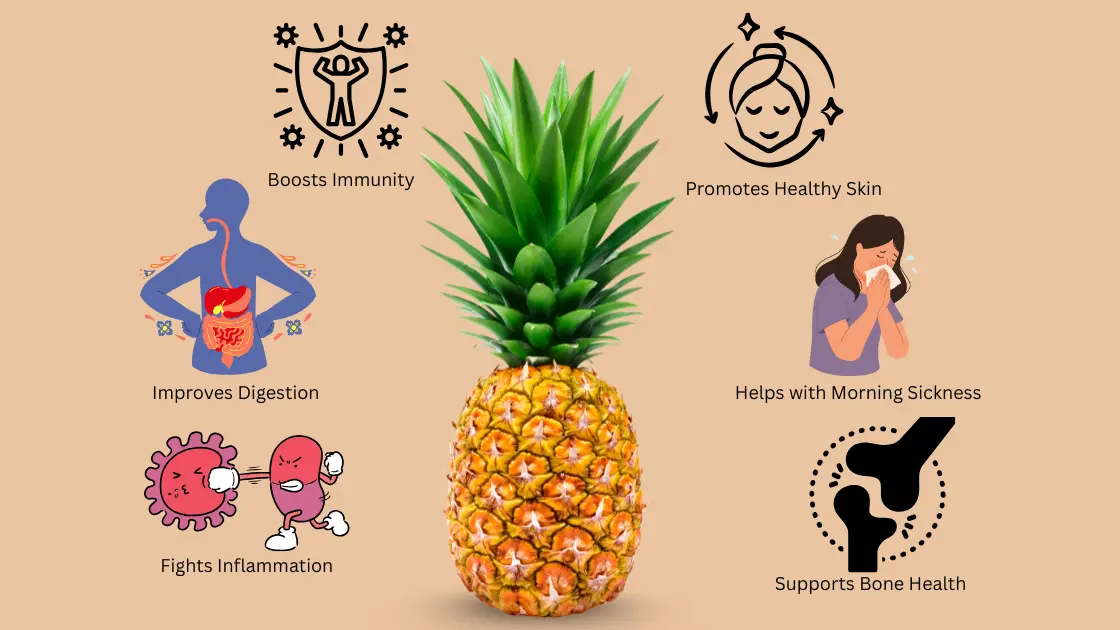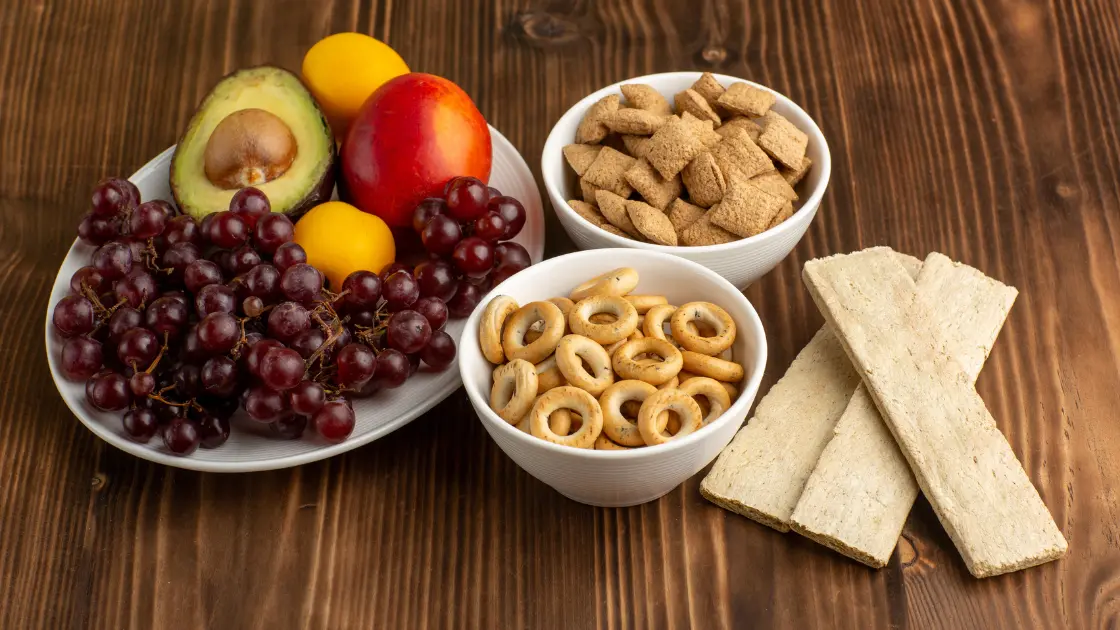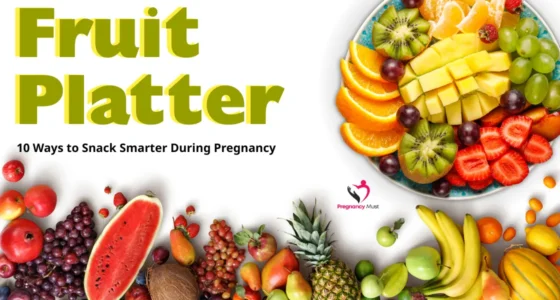Pregnant women ask a lot of questions when it comes to Pineapple and pregnancy. Can pregnant women eat Pineapple? Can you eat Pineapple while pregnant, or should it be avoided? This is one of the most popular concerns, at least when it involves having a healthy diet in pregnancy. This article will answer all your burning questions about Pineapple during pregnancy, the benefits, the risks, and everything in between.
Table of Contents
- Is Pineapple Safe During Pregnancy?
- Dietary Value of Pineapple to Pregnant Women
- Can Pineapple Be Eaten by Pregnant Women?
- The Role of Bromelain in Pineapple During Pregnancy
- Should a Pregnant Woman Eat Pineapple?
- Health Risks of Pineapple During Pregnancy
- What Are the Benefits of Eating Pineapple During Pregnancy?
- Can You Eat Pineapple While Pregnant in the First Trimester?
- Pineapple and Pregnancy: Moderation is Key
- Is Pineapple Safe During Pregnancy?
- FAQ Section: Pineapple and Pregnancy
- Conclusion: Pineapple and Pregnancy
Is Pineapple Safe During Pregnancy?
The answer to it is an obviously yes but with some precautions as it is safe to consume Pineapple during pregnancy. Let’s explore why Pineapple in pregnancy can be beneficial, and also what to keep in mind when consuming it.
Dietary Value of Pineapple to Pregnant Women
Pineapple is also high in key nutrients hence is a great supplement to the diet of a pregnant woman. It is rich in vitamin C, fiber and manganese which are three essential nutrients to the health of the mother and the baby.
1. Vitamin C increases immunity and collagen
Pineapple contains high levels of vitamin C that fortifies the immune system and single-handedly creates collagen. This helps promote good skin, blood vessels and tissues in mom and baby and it also helps in tissue healing and repair. The vitamin C also assists in combating infections and leads to the sound organ and tissue formation of the baby and hence the mother and the baby are well cushioned during pregnancy.
2. Fibre helps in digestion and avoids constipation
The pineapple fiber also maintains healthy digestion and ensures prevention of constipation that is a major pregnancy problem. It maintains the regularity of bowel movements and discomfort, and the bromelain enzymes help in easier digestion as well. Being a product with a combination of fibre and enzymes, it is especially recommended during pregnancy, given that pregnant women can experience bloating and stomach discomfort with a change of hormones, and therefore the process of digestion becomes much more enjoyable.
3. Manganese promotes healthy bones
Pineapple is rich in manganese, which helps promote healthy bones in both the baby and the mom. It assists in the formation of collagen in bones and joints, which means that they grow healthy, and there are no complications with bones in conditions of pregnancy. Sufficient manganese intake assists in the creation of bone density in the mother, the baby that is to be born and makes sure that bones remain healthy to accommodate the extra weight of the pregnancy as well as the growth of the skeletal structure of a newborn baby.
4. Hydrates the body
Pineapple contains a lot of water, and this hydrates a person. Pregnancy is all about hydration because a larger blood volume will place a burden on the body when it comes to hydration and aids in staying level in amniotic fluid. It also helps keep away some of the common pregnancy signs, such as drowsiness and dry skin, and keeps the kidneys hydrated to eliminate any extra waste in the body, thereby preventing all the associated problems, including urinary tract infection (UTIs).

5. Helps to decrease swellings
Pineapple has a substance known as bromelain, which may reduce inflammation as well as swelling, especially on body parts such as the feet and legs, a very common problem in late pregnancy. As pregnancy advances, the body is able to accumulate more fluids, and this causes one to feel and appear bloated. Bromelain assists in relieving these symptoms by lowering the amount of water that is retained in the body and relaxing the inflammation that may be in the body, which leads to overall comfort and ease of movement.
6. Anti-oxidant-rich
Pineapple is rich in antioxidants, which assist in keeping the body up against oxidative stress. These antioxidants help the cells and can prevent complications of pregnancy due to free radical damage. The flavonoids, which are antioxidants of Pineapple, can defuse the damaging free radicals, thereby safeguarding both the mother and the infant against the possible cellular damage that may cause complications like preterm birth or developmental delays.
7. Benefits the heart
Pineapple is rich in potassium and magnesium, which keep blood pressure under control and also keep the general heart condition in check, which is critical to a healthy pregnancy. Appropriate potassium and magnesium quantities assist in keep the fluid levels in a balanced state to minimize risk of elevated blood pressure and contribute to the healthy heart operation. This is particularly so since pregnancy puts extra pressure on the cardiovascular system and these are the nutrients which promote the efficient functioning of the heart.
8. Aids in the management of morning sickness
The sweet and sour taste of Pineapple may be able to cool down the stomach hence can be used as an anti-vomiting bill or morning sickness particularly during the first trimester. Natural sweetness can be used to promote digestion and combat nausea, and the abundance of vitamin C can bring down the severity of the symptoms, which is much welcome in early pregnancy stages when morning sickness is most frequent.
Consuming Pineapple during the pregnancy diet offers the following health benefits aside in the already existing benefits of enhancing both your and the baby health.
Can Pineapple Be Eaten by Pregnant Women?
Yes, pregnant women can eat Pineapple, provided they take it in moderation. Pineapple also has an enzyme known as bromelain that has been perceived to have the capability of softening the cervix. Although this can instill fears, there is no medical evidence to show that consuming moderate quantities of Pineapple will cause one to have an early birth. Bromelain levels diminish after the fruit ripens and is fully consumed; thus, it is safe to drink in general.
The Role of Bromelain in Pineapple During Pregnancy

Bromelain is a combination of enzymes contained in a pineapple; the misconception is that this substance can cause labor. However, consuming Pineapple during pregnancy in regular quantities will not lead to early contractions or cause harm. Only in high doses found in concentrated supplements, bromelain may have an adverse impact in case of pregnancy, and should be avoided.
Should a Pregnant Woman Eat Pineapple?
Yes, however, it has to be consumed moderately. In extreme cases, the consumption of pineapples can make some people feel uncomfortable after they use it so much because it is acidic and therefore it can result in heartburn. Moreover, one should remember to have a freshly washed pineapple so as to prevent any foodborne diseases.
Health Risks of Pineapple During Pregnancy
Although Pineapple is safe in pregnancy, one should remember a few things about that:
1. Vitamin C increases immunity and collagen
Vitamin c in the Pineapple boosts immunity, helps in breaking collagen and healing tissues. It keeps the mother and child safeguarded against infections and promotes healthy growth of skin and organs.
2. Fibre helps to digest and prevents constipation
Pineapple provides good digestion and avoids the problem of constipation that is common during pregnancy due to the fibre that the fruit contains. It also serves to ease bloating and constipation, and the digestive process becomes easier during the pregnancy.
3. Manganese helps bones
The presence of manganese in pineapple helps promote the development of the bones of both mom and baby. It aids in the formation of bone density and collagen, which is needed to have good bones and joints during the pregnancy period.
4. Makes the body hydrated
Pineapple contains a lot of water, which helps our body stay hydrated, and the added volume of blood and fluid levels of amniotic fluid is helped by the high water content in Pineapple. Also, it helps prevent fatigue and dry skin during pregnancy.
5. Helps to fight edema
Inflammation and swelling, particularly of the legs and feet, are minimized through bromelain in Pineapple. This serves to reduce the amount of water retention which occurs at the later stages of pregnancy.
6. Antioxidants rich
Rich in antioxidants, pineapple guards against oxidative stress and destruction of free radicals, lowers the chances of complications and maintains the health of both mother and child.
7. Benefits the heart
Pineapple contains potassium and magnesium that maintain blood pressure and heart health, thus avoiding cardiovascular complications that may come with pregnancy, and ensuring that the mother is fine.
8. Aids in morning sickness
The sweet, tangy taste of Pineapple and its ability to contain vitamin C are beneficial in decreasing nausea and morning sickness, especially during the 1 st trimester of pregnancy, which settles the stomach and normalizes digestion.
What Are the Benefits of Eating Pineapple During Pregnancy?

The benefits of eating Pineapple during pregnancy are not just about the nutrients it provides. It may also be useful in some of the pregnancy symptoms.
1. Fights inflammation
Pineapple contains bromelain, which is useful in reducing inflammation and, as such, may help reduce the pain in the joints, which is also a common problem during the later stages of pregnancy. In pregnant women, hormone changes and weight gain, in general, increase inflammation, which may impose additional loads on joints. The anti-inflammatory effects of bromelain can be used to decrease swelling and relieve pain. It can especially be helpful to those women who experience some discomfort in their feet or other joint areas when they are expecting a child.
2. Improves digestion
Pineapple is rich in fibre that will help in healthy digestion, which can be of great help in preventing constipation, which is one of the effects experienced during pregnancy. The digestive process is also aided by the natural enzymes in pineapple, especially bromelain, which help break down proteins and facilitate digestion. Also, the amount of water in the fruit maintains proper hydration, which is vital in carrying out bowel movements. It can thus be said that taking Pineapple can keep your digestive system well lubed and minimize the pain typically attributed to the constipation that is linked with pregnancy.
3. Boosts immunity
Pineapple contains a lot of vitamin C, which is a potent antioxidant which builds up the immunity. This is especially so during pregnancy, when the immune system of the body changes. Vitamin C is an immune-enhancing agent that prevents infections and diseases in the mother and the baby alike. Vitamin C is also involved in the formation of collagen, and thus it assists in the formation of healthy skin, blood vessels, and bones, which make up the overall welfare of the developing baby. Consuming Pineapple on a regular basis can therefore strengthen the defence system of your body, thereby making you less susceptible to common colds or any other infections during pregnancy.
4. Makes the skin healthy
The fact that pineapple has high levels of vitamin C and water also helps give healthy skin during pregnancy. Collagen production is vital to maintaining firm and elastic skin, and this is made possible by Vitamin C. This is especially helpful since pregnancy may have the effect of drying the skin texture or leaving marks in the form of stretch marks. When Pineapple is consumed, skin health can be maintained and the skin has a natural glow because the new skin cells and tissues are supported by the metabolic processes of the body.
5. Aids morning sickness
Nausea and vomiting are the common problems that pregnant women have during early pregnancy, which is also called morning sickness. The natural enzyme present in Pineapple, especially bromelain, has been proposed to reduce nausea and calm the stomach. The combination of both the sweet and tart tastes might also alleviate the pain of morning sickness. Audio is the name of an audio that was dangerously unleashed on YouTube. I love it when I see some unscrupulous women telling me that the relief of this common symptom of pregnancy can be gotten by eating small quantities of fresh pineapples.
6. Bone health
Besides its digestive and immune-enhancing properties, Pineapple has manganese, which, according to researchers, plays an essential role in ensuring individuals have healthy bones. Manganese helps in collagen production, which is also a protein that helps with the strength of the bones, joints and cartilage. The mother and the growing fetus require this because the fetus derives its development through healthy bones. Pineapple, as a part of your diet, will support a good supply of the nutrients required by the mother and the unborn baby in order to maintain good and healthy bones during the pregnancy period.
Can You Eat Pineapple While Pregnant in the First Trimester?

First trimester of pregnancy is a critical stage of this period and many females are wondering whether they can eat Pineapple in order to relax and have some rest. Pineapple is safe to consume during the first trimester of pregnancy, though one should do it moderately. Pineapple may also be utilized to alleviate morning sickness by increasing vitamin C, which can also be very helpful to the nausea.
Pineapple and Pregnancy: Moderation is Key
Pineapple is very beneficial, but one should take it in moderation. It is better to take a small amount of pineapple at a time to eat daily rather than to eat a lot. It may lead to an upset stomach, as a result of the acidity, in excessive quantities.
Is Pineapple Safe During Pregnancy?
Should you worry about the safety of consuming pineapple, then consider the fact that it is a healthy, nutrient-rich fruit that can be a great inclusion in your diet during the pregnancy period. Nevertheless, in excess or supplemental quantity, one may find that Pineapple might also have certain side effects. Before you introduce anything new to your diet because you are pregnant, you should always consult your healthcare provider first.
FAQ Section: Pineapple and Pregnancy
1. Can I eat Pineapple while pregnant?
Yes, we can consume Pineapple during the pregnancy in small quantities. It is full of nutritive values which includes vitamin C, fiber and manganese.
2. Is eating pineapple during pregnancy during the first trimester safe?
Of course, the first trimester is safe to consume moderately consumed Pineapple. It is useful in cases of nausea and aids in digestion.
3. Does Pineapple result in miscarriage?
No, nothing shows that Pineapple may cause miscarriage when eaten. At normal levels of consumption, the bromelain enzyme of Pineapple is not enough to have any effect on pregnancy.
4. Is Pineapple not to be consumed by a pregnant woman?
No, there is no need to avoid Pineapple during pregnancy unless you experience allergic reactions or heartburn from it. Never indulge in it.
5. Can you eat Pineapple while pregnant in the third trimester?
That is correct, one can eat Pineapple during the third gestation trimester. Its nutrients have the potential to address inflammation and promote proper digestion in pregnancy.
Conclusion: Pineapple and Pregnancy
To sum up, there is nothing dangerous about Pineapple and pregnancy if everything is moderate. It has a number of health advantages for a pregnant woman, such as digestion and immune health. It is necessary to be aware of certain digestive discomfort or heartburn caused by overeating and to make sure that the fruit is always fresh and clean. If you feel uneasy about it or have some troubles, consult your healthcare provider and make it a regular addition to your diet only after consultation.
Explore more on Pregnancy Must –









